"See you, girl!"
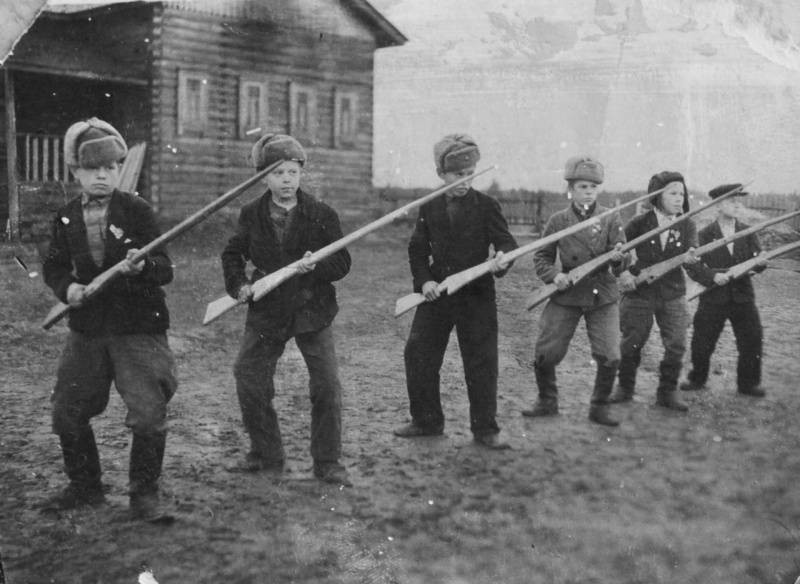
Remember everything. To the very blood of his memory, to the very depth of his heart. This memory has become sacred for them, and they tell about the past days of their life as if they ate black donuts yesterday, died down in fear of the barking shout of German soldiers and helped wounded soldiers.
Raisa Popova was born in 1929 year, she is one of those whose childhood years crossed out a terrible misfortune. She endured hunger, exhausting labor, occupation, tears of the mother. Never forget it.
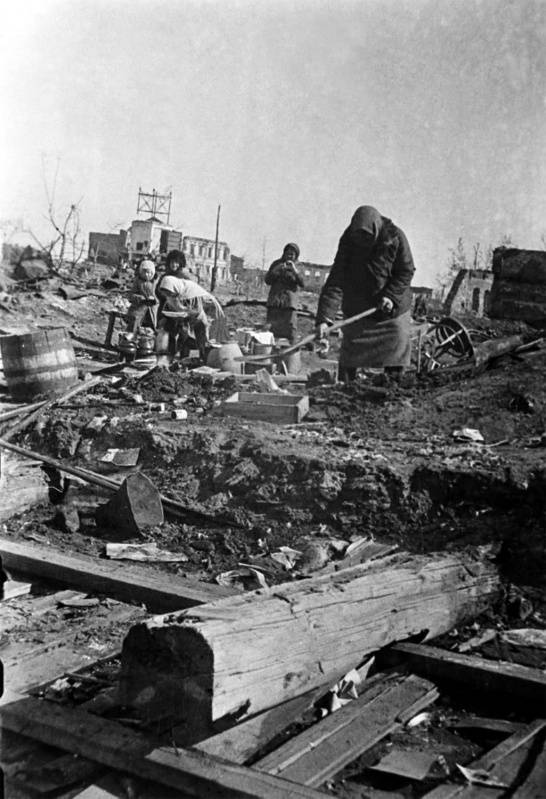
The most difficult time began in the days of the retreat of our troops. Civilians whispered with horror: "Surely the fascist will come to us?" They did not want to believe, but they had to, when planes with black crosses on their wings began to fly over the village.
One such fighter once flew over the main street of the village, and then, turning around, as if saying goodbye, cut off a crowd of civilians with a machine-gun fire. Wounded fell, a woman screamed over a dead child.
On the same day, Paradise, along with her mother, went for water to the river. Mother stood and waited for the girl to get and pick up water. Suddenly a soldier emerged from the bushes right on Paradise: tattered, wounded, scary. The girl screamed.
- Do not worry, my dear, I own, - he whispered. - Who is waiting for you there? Nurse? Tell her to bring some bread, go for three days, have not eaten any crumbs.
The Soviet soldier, apparently, was surrounded, and now he is in the German rear.
For four days, the girl and her mother nursed a fighter, and then, dressed in the old clothes of the Rain Father, the soldier decided to make her way to his.
“Well, see you, my dear,” he said to the girl goodbye, “I’ll live, I’ll definitely come to you.”
But they never saw him again.
In the meantime, the Germans imposed new orders in the village and distributed their houses to all the houses.
“Our hut was big,” recalls Raisa Georgievna. - Because four German soldiers settled in the house right away. One of them was probably some kind of treasurer, I carried a large metal chest with money or goods, I don’t know.
The soldiers staying in the house treated the children quite well, sometimes even feeding them, despite the prohibitions of the commanders. Apparently, hungry children caused pity among those invaders, in whose soul something human was left.
The kids even divided the Germans into "garny" and "pagans". The second they called those who dropped bombs on houses and fired at people.
Mother sternly ordered the children not to talk about the Germans, not even to look in their direction, realizing that there were very few “women” among them.
No matter how hard it was, but children found time for fun. While playing, they forgot that there was a war, fathers at the front, that they constantly wanted to eat. The girls amused themselves with rag dolls, played hide and seek, lapta, jumped over the rope. In winter, they were sledding from a hill, which was located next to their house.
Children were naughty in the house with the Germans, despite the maternal prohibitions. One day, Paradise, playing around, pushed a metal box from the stove, but directly on the head of the fascist to whom he belonged. The German gasped from the blow and grabbed his head. The girl looked scared as blood was flowing through his fingers, while the rest of the soldiers were trying to help.
Brother Vasily rushed out into the street and shouted to his mother: “Raika’s“ grave ”to the German has punched his head!”
A woman rushed into the hut, saw a frightened daughter, a bloody fascist, and fell to her knees:
- Pan, do not kill, do not kill her, pan!
The German turned away and waved his hands: they say, get out of here!
The girl was immediately blown away by the wind, and her mother, going out into the courtyard, began to sob from the experienced fear.
When the German retreat began, there was an infirmary in the house and in the courtyard. Raisa G. recalls that there were wounded around, and a fascist officer hit mother hard, who refused to treat their wounds and bathe seriously ill patients.
Many had to endure the civilians in the occupation, so the joy with which they met native soldiers was unlimited. Raisa G. remembers this day, as if everything was yesterday.
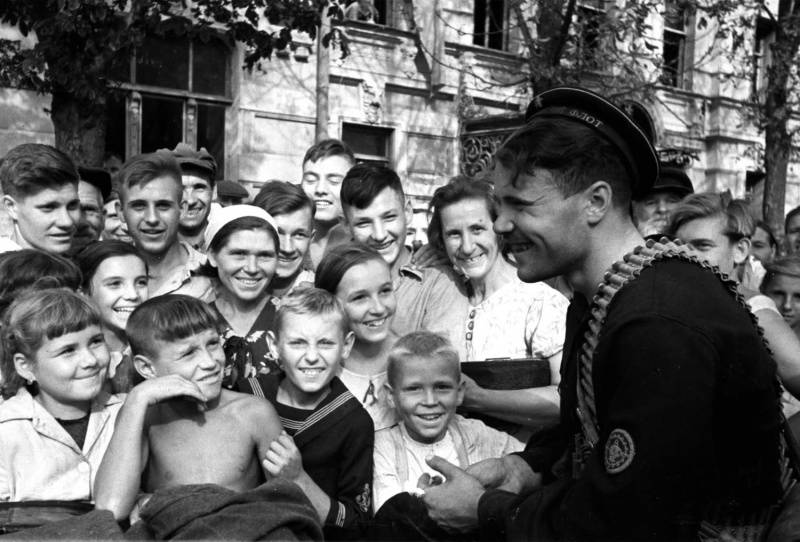
“We hear a knock on the door,” she says, “such a loud knock, we were even afraid.” We ask: “Who is there?” And in response: “Open yours!” We look: and there our soldiers, our dear ones, are long-awaited.
- Are there Germans in the village? - they ask.
“Oh, son, here they are so richly rich,” mum lamented.
- Do not worry, mamma, more of them will not be here!
Of course, the war did not end there, but the joy of liberation was immense. Everyone understood: Victory will be ours!
There was much good in the life of Raisa Georgievna. After the war, she graduated from school, began to learn Morse code in the courses of telegraph operators. She worked on the postal telegraph, and then she was transferred to work at the communications center.
After construction in Donetsk (Rostov region), the central telegraph became a telegraph operator. She served as a telephonist for MTS, was in good standing with the management, and received honorary diplomas and thanks for her hard work.
Once they even wrote about her in a local newspaper, Raisa Georgievna kept a clipping from a newspaper. The article is called “Personal - the sixth” (this was the call number of a telephonist).
There is a photo where Raisa Georgievna is at work. So it seems to me that she is at the communications console, remember, as in Vysotsky: “Girl, honey! I ask: extend! You are now like an angel, do not get off the altar! ”
Raisa Georgievna was just the kind of person who connects people, helps them to hear each other. She says that she has lived a happy life: she was engaged in her favorite work, raised her son, who, thanks to her efforts, became a wonderful doctor, candidate of medical sciences. Now he helps people, and his mother is proud of her son, who justified all her hopes. Raisa Georgievna Popova looks at the world with optimism, tries not to lose heart in difficult times, does not like to grumble, as some representatives of the older generation do.
Raisa Zakharchenko: I remember black donuts
I am among those about whom the children of war are now talking. I was two years old when the war began. We lived in a village, seven kilometers from the city of Morozovsk. There were seven of us in the family: grandfather, grandmother, mother, mother's sisters of sixteen and eleven years old, brother of seven years old and me. Older mother's brother Ivan was in the war.
The first thing that came to mind is the retreat of ours. The soldiers were walking through the village. They were exhausted, hungry. All the village poured into the street to see. In the eyes - dumb reproach.
My grandfather reached into the attic, took out a bag of breadcrumbs, took out the gate and began to distribute to the soldiers. Grandma, pushing her grandfather in the back, grumbled:
- What are you doing, old, the family themselves, there is some.
- Nothing, grandma, somehow we will live, because these are our sons, our protectors.
Then enemy planes swirled over the village, bombing began. Hid in the basement or ran into the corn field. And soon our village was occupied by the Germans. Housed in huts. Located in our, evicted us to the barn.
Fearing for the younger daughters, grandfather secretly, at night, took them to a distant farm and left them with his friends. There were no Germans there.
I hardly remember the occupation period, but when the Germans were kicked out and we returned to our hut again, I remember well. Grandfather flooded the stove, heated a large cauldron of water, everyone bathed, boiled clothes, cleaned the rooms and went to bed in the clean beds in the evening.
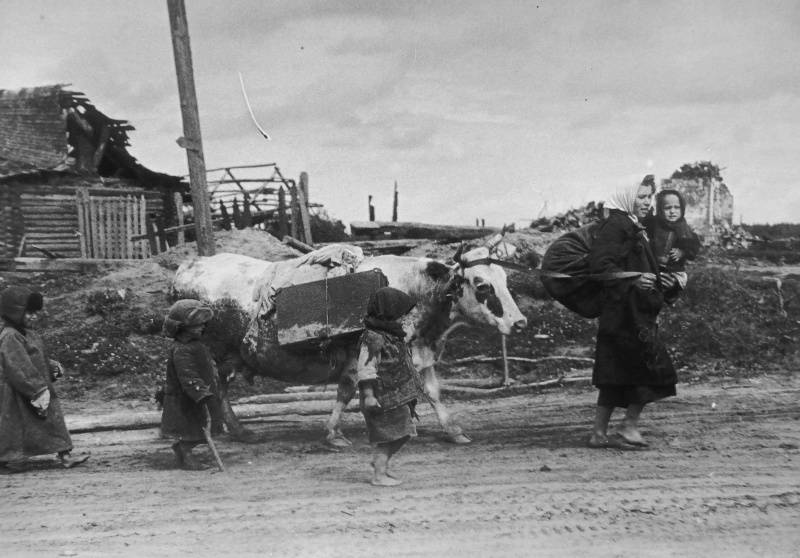
In the middle of the night there was a knock at the window. In a fright, everyone woke up. And the first thing that came to mind - again the Germans.
A knock was repeated, and the grandmother clung to the glass:
- Who's there?
- Mom, it's me, open up.
In a panic, my grandmother did not immediately understand and again asked:
- Who's there?
- Mom, it's me, your son Vanya.
Everyone happily jumped up and ran to the door. After a serious injury and long wanderings through the hospitals, Uncle Vanya returned home disabled, but alive. And it was a great happiness.
Uncle Vanya went to the front in the first days of the war. In his twenty years he was in the rank of senior sergeant, commanded a platoon. In one of the battles during the liberation of the settlement, Uncle Vanya showed courage and resourcefulness, the platoon did not lose a single soldier. For this, he was presented to the award - the medal "For Courage." Then he did not manage to receive this award. He was awarded the medal only in 2001, on his eightieth birthday.
Sometimes I recall some moments of life, at first glance insignificant. However, in the children's memory, they left their mark. For example, my peer, childhood friend Vitka. He lived together with his mother in a tiny little hut. Their only nurse, a cow, died in winter from hunger and cold. Dunyakha, that was the name of the mother in the village of Vitka, saving her son from starvation, breastfeeding him during the whole war.
I remember how we ran along the street, raising dust with a bare foot. Then suddenly he stopped, ran to his mother and leaned against his chest, and I waited patiently to continue the game.
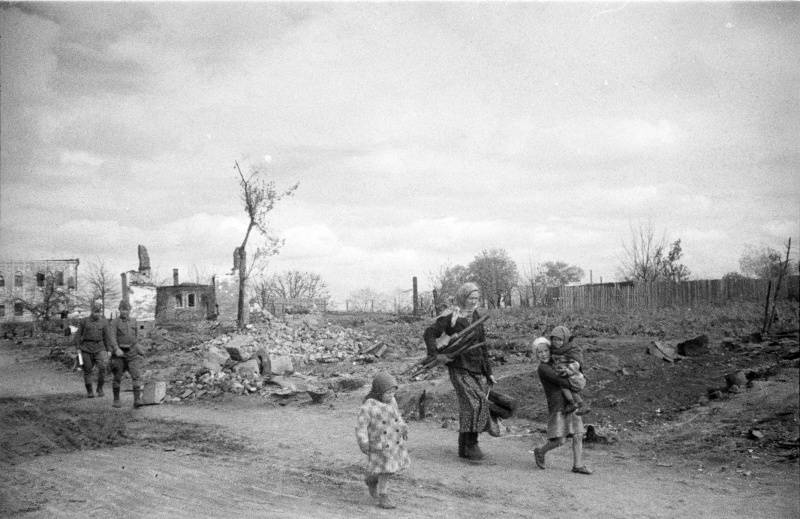
For some reason, I also ran into one memory case, which occurred in December 1943. Mom and her sister Nastya, who was barely 18 years old, recruited to the mines. Mom decided to take me along. Grandmother made us buns of burnt wheat for the road, which people were taking away from a burnt-out elevator. The pyshki were black like coal, but to me they seemed so tasty, and my hand stretched to the teapot, in which my grandmother put the cakes.
Here we are at the station. The train approached, a crowd of people rushed to the car. Noise, shouts, crush. Somebody's hands caught me and handed me over the heads of the car. I'm in a fright, looking for my mother. With great difficulty, she and her aunt managed to get into the car. From then until now, I feel anxious, and tears come to me when I, leaving somewhere, am at the station and see an approaching train.
Here we are on the spot. Then there will be the city of Donetsk, but for now - the bare steppe, mine waste and barracks. In one of them they gave us a room. Some old woman lives with us. On the road, her daughter fell behind the train. Out of desperation, granny was seriously ill and kept hoping that her daughter would find her. Mom and aunt, leaving for work, left us alone. I remember well how granny said that when she died, she would leave me her pillow. The old woman soon died, but I did not notice, I thought she was sleeping.
When Aunt Nastya went to get a job at the mine, she already knew that the miners were given a kilogram of bread on the cards. Because the question of where you go to work, without hesitation, said: miner. She was accepted. Then women were taken for any job, as there were not enough men, there was still a war. Here, perhaps, is the little that was remembered about the hard time that adults and children had to go through.
I'm happy that looks like him
She talked so well and soulfully about her father that I involuntarily envy her because I was not like this. Svetlana Chernousova remembers almost everything connected with her father Mikhail Evgrafovich Chernousov, who celebrated his 8 anniversary on June 80.
- My first memories of dad: I have grown to his hand, and it became convenient for me to hold on to her, and not hang on her, barely touching the heels of the ground. Dad is wearing a military uniform, wearing an officer's cap with a blue band - this means that he is a pilot. Tall, curly, with a redhead. (I got all these qualities.) I saw and perceived it from the bottom up. Is always. Even now, when dad was a little lower, and I was a little higher, and we were almost equal.
Dad was born five years before the war. The family had four sons: the eldest Ivan, then Vasily, Gregory, and the youngest, my dad, Mikhail.
They had twenty differences with their older brother. Ivan in the 1941 year went to war and died. All the rest - father and Vasily - returned wounded, contused, but alive. Dad could hardly have known and remembered an older brother, but according to his father, it was Ivan’s short life that was always something of a compass for him, he was equal to him. And now Ivan is getting closer.
When the Germans came to the Romanovskaya village (although mostly they were Romanians), the pope was about six or seven years old. History Romanov's underground, he knows not from books, but from his own childhood memories and fears, according to the stories of his grandmother and those who witnessed and participated in those events. Papin's brother Gregory (then he was 15) was also a member of the fighter squad. The 15-16 boys for years were supposed to track down the scouts and, if possible, carry out subversive work. When the Germans announced their hunt for them, the grandmother hid Grisha, like the other mothers of their sons. Grisha survived. Many are not. The future father was a child, and in the children's consciousness the war was not imprinted with a terrible tragedy. Although there was hunger, fear, and death around. But dad grew up and the war ended.
How and when dad “fell ill” with the sky, he did not tell. But this disease does not let him go so far. After school, he entered the Kiev military aviation school. And stories about cadet life, planes and flights are still the favorite topic of my father's memories. It is from dad that I know the names and pattern of aerobatics and can distinguish "An" from "Yak." Despite the fact that the father served in aviation quite a bit, and then 40 years as a teacher, his image is inextricably linked with the sky, aviation and military service. Favorite films: “Only Old Men Go to Battle” and “Officers”.
My mom and dad met at school. After being commissioned from the army for health reasons, he taught physical culture at the Romanov school.
In class, my father demanded military discipline, and everyone knew that orders were not discussed and were not repeated twice. But there is not a single guy who in the army would not have remembered papa with a kind word. For teaching to be a soldier. He brought up more than one generation of real men. Many of them, like my brother, have chosen the profession - to defend their homeland. And there are those who my father's science helped survive the war.
It is necessary to try very hard to find a person in Romanovskaya who would not know my parents. And even then, it will not be local. They have learned four generations of people. Not just learned - brought up. Mom says that while they were raising other people's children, they grew up like grass in a field. But this is certainly not the case. Normally we grew up. It should be parents somewhere to appear, as they all greet. Their first students today are over seventy.
Information